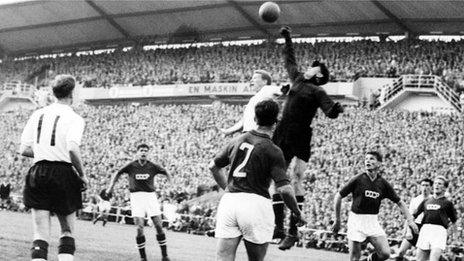Euro 1988: Valery Lobanovsky's last stand for Soviet Union
- Published
Best moments of Euro 1988
The story of the 1988 European Championship is one tinged in vibrant orange, with Marco van Basten's audacious volley at its centrepiece.
The AC Milan striker's goal from the narrowest of angles, external helped earn the Netherlands a 2-0 victory over USSR in the Munich final and the country's first major title.
However, with the Soviets missing a penalty late in the game, it is often forgotten how close they came to piercing the orange bubble.
Though the final signified a new chapter in Dutch football, the class of 1988 succeeding where the 1970s crop had fallen short of silverware, it also ended a golden period for the Russian game as the fall of communism began to divide its nations.
It is worth remembering that the runners-up - led by legendary coach Valery Lobanovsky - beat the Dutch 1-0 in their opening game of the tournament in the former West Germany.
They then went on to top their group, beating England along the way, and swept aside a strong Italian team 2-0 in the semi-finals, before coming up against the likes of Van Basten, Ruud Gullit, Frank Rijkaard and Ronald Koeman in the final.
But the fact it needed Van Basten's special goal to beat the Russian team showed the depth of talent which ran through a side that included eight players from club side Dynamo Kiev.
It was no coincidence, given that Lobanovsky was still in charge at Dynamo, one of the strongest club sides in Europe.
He led them to the Cup Winners' Cup in 1986, having won the same competition nine years earlier.
"It was the best chance for the Soviet Union to win a trophy," former Dynamo and Soviet defender Sergei Baltacha told BBC Sport.
"At that time we were a good team, most of our players were from Kiev and we dominated Europe. We knew we would do well."
Baltacha, who came on as a substitute in the 1988 final, cites a golden generation of Dynamo players that included the now Ukraine boss Oleg Blokhin, Vasily Rats, Alexei Mikhailichenko and Igor Belanov as the reason why the team made such an impact at international level.
But the 54-year-old, father of Britain's number one woman tennis player Elena Baltacha, also believes the strength of the Soviet domestic league played its part in developing such a talented group.
"At that time, the Russian championship was very strong, because it had six different republics," he added. "All 16 sides were very strong.
"It's why the Russian national team was very good. Every game was like the Champions League. It was why European games were quite easy because every week you were playing at the top level anyway.
"After the Soviet break-up, there are only a few countries left at the top level: Russia and Ukraine. The rest, like Georgia, are not playing in the World Cup a lot. Big damage happened to USSR football after that."
Once the Soviet Union began to splinter, so did the strength of the national team. Many players had already headed west, with Baltacha joining Ipswich after the 1988 European Championship.
By the 1990 World Cup, Lobanovsky was shorn of his most talented Dynamo players and USSR finished bottom of their group. At the 1992 Euros, the country competed as the Commonwealth of Independent States (CIS).
Through no fault of his own, Lobanovsky's powers at international level were fading. A shame for a man who had transferred his culture of excellence to the national team, says Baltacha.
"Lobanovsky was everything for Dynamo Kiev and Russian football," he explained.
"Ukraine cannot reach that level now. At that time a lot of people knew the city of Kiev because of Dynamo and because of Lobanovsky and the players that played for him.
"He was the best coach I've ever seen. He was a coach who brought a scientific background to football in the early 1970s and, when I joined Kiev in 1976, we had a background of doctors and scientists, the kind of thing that not even now many countries have.
"He was very tactical, too. We played the kind of pressing game like Barcelona do now. It was a new era for football. As a person he was very demanding and was an example for us because he was a top professional."
After a stint in the middle east, Lobanovsky returned to Kiev where he oversaw the development of former AC Milan and Chelsea striker Andrei Shevchenko and led Dynamo to the 1999 Champions League semi-finals. In 2001, he then managed the Ukraine team for another year.
Following his death from a stroke in 2002, Dynamo named their stadium after Lobanovsky, but Baltacha says the club does not hold the same standing in Ukrainian football now he has passed away.
"People stopped believing in his philosophy," Baltacha said. "That's a shame. People used to learn how to play football from Lobanovsky."
Few knew that once Van Basten struck, it would have such a significant impact on Russian and Ukrainian football.
- Published12 May 2012
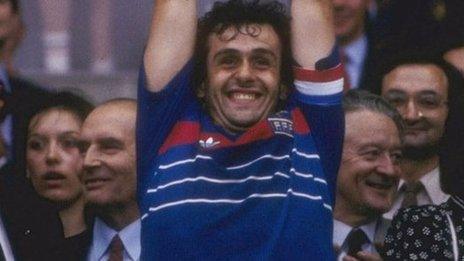
- Published12 May 2012
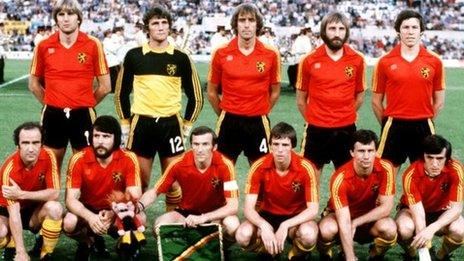
- Published12 May 2012
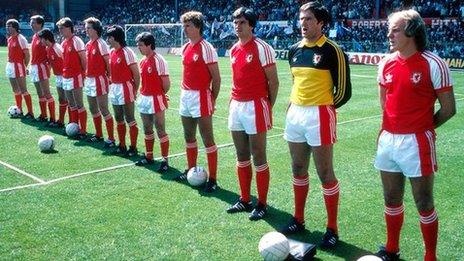
- Published12 May 2012
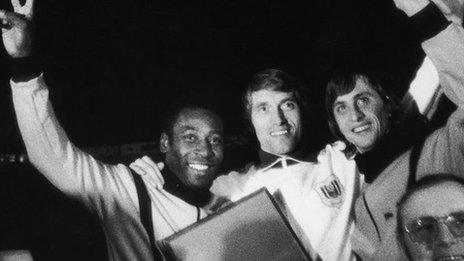
- Published12 May 2012
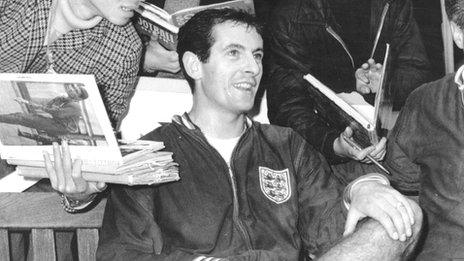
- Published12 May 2012
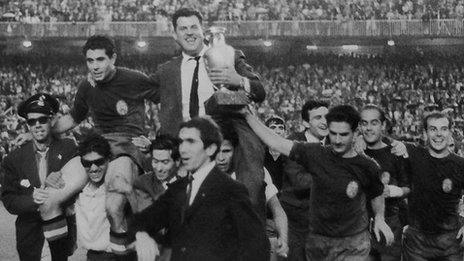
- Published21 May 2012
